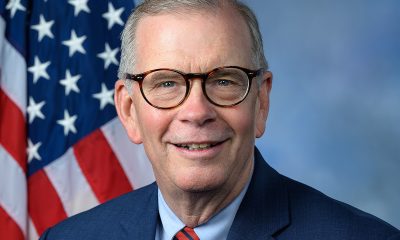National
Obama’s State of the Union light on LGBT issues
President criticized for neglecting ENDA, executive order for non-discrimination
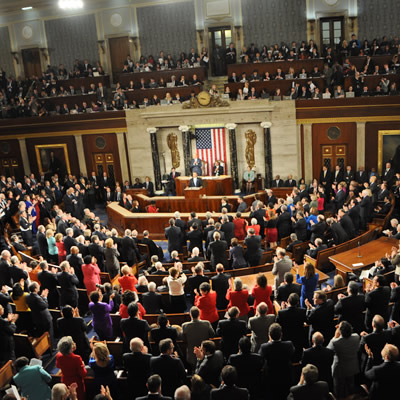
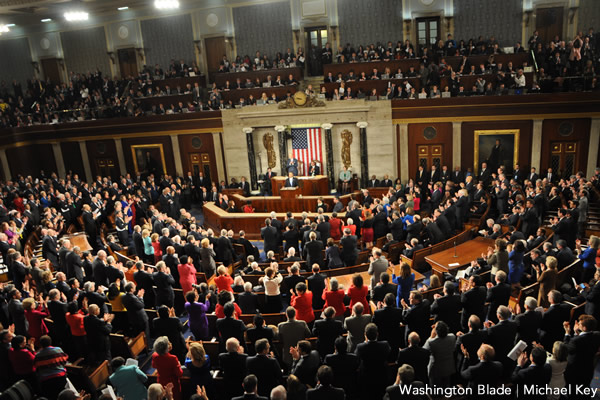
President Obama was criticized by LGBT advocates over his State of the Union address. (Washington Blade photo by Michael Key)
President Obama had few words in his State of the Union speech Tuesday night on LGBT issues, disappointing many advocates who had wanted him to address the lack of federal non-discrimination protections for LGBT people.
Devoting a large portion of his speech to income inequality, Obama called on Congress to pass other initiatives — such as a Voting Rights Act, a measure to ensure equal pay for women and immigration reform — and pledged to sign an executive order raising the minimum wage to $10.10 an hour for federal contractors.
“In the coming months, let’s see where else we can make progress together,” Obama said. “Let’s make this a year of action. That’s what most Americans want: for all of us in this chamber to focus on their lives, their hopes, their aspirations.”
LGBT advocates had been pushing Obama to include in his speech a call to pass the Employment Non-Discrimination Act and a pledge to sign an executive order barring federal contractors from discriminating against LGBT workers.
Obama’s continued decision to withhold the LGBT executive order became more pronounced after he promised during his speech to take executive action if Congress doesn’t pass legislation, and enumerated a specific plan to boost the minimum wage through executive order. That raised questions about why he hasn’t done the same for LGBT workers.
“What I offer tonight is a set of concrete, practical proposals to speed up growth, strengthen the middle class, and build new ladders of opportunity into the middle class,” Obama said. “Some require congressional action, and I am eager to work with all of you. But America does not stand still — and neither will I. So wherever and whenever I can take steps without legislation to expand opportunity for more American families, that’s what I’m going to do.”
But Obama’s speech wasn’t completely devoid of references to the LGBT community. The president identified marriage equality as one of those issues with which the White House is partnering with “mayors, governors and state legislatures” on throughout the country.
Further, he said the administration pursues a robust foreign policy because “we believe in the inherent dignity and equality of every human being” regardless of categories like sexual orientation. Obama also said America values “equality under law” in his speech, which is of importance as courts decide the issue of marriage equality.
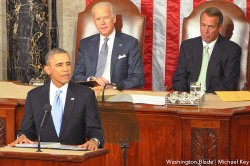
President Barack Obama, Vice President Joe Biden and Speaker of the House John Boehner at the 2014 State of the Union Address. (Washington Blade photo by Michael Key)
Nonetheless, the speech fell short of what LGBT advocates were calling for, prompting disappointment.
Chad Griffin, president of the Human Rights Campaign, responded to the president’s failure to address LGBT issues in his speech with criticism, a striking change in tone from the organization’s usual praise of Obama as a strong ally.
“The president’s message tonight failed to address the needs of LGBT workers looking for a fair shake in this economy,” Griffin said. “Not only was there no call for the House to pass a federal law to protect LGBT workers nationwide, President Obama also sidestepped his commitment to take action where Congress has left off, leaving out an order prohibiting discrimination by federal contractors.”
Griffin added Obama “missed a real opportunity” to commit in the State of the Union to “executive action to address anti-LGBT discrimination for the millions of Americans employed by federal contractors.”
The absence of ENDA was particularly noteworthy because just months ago, for the first time in history, the Senate approved the measure on a bipartisan basis, leaving the House as the only obstacle toward passage.
Although the president made no mention of ENDA during his speech, the White House included the legislation as part of a fact sheet distributed to reporters prior to the address, identifying LGBT non-discrimination as an issue on which the administration is “continuing to work with Congress.”
“Today, federal law prohibits employment discrimination based on race, sex, religion, and disability,” the fact sheet states. “It’s time to add sexual orientation and gender identity to that list, so that no American worker can lose his or her job simply because of who they are or who they love. ”
After noting that the Senate last year passed ENDA by a bipartisan vote, the fact sheet says Obama “renews his call for the House to do the same.”
Other advocates said they would continue to push Obama on the executive order despite the president’s exclusion of the directive from the State of the Union address.
Tico Almeida, president of Freedom to Work, said Obama’s pledge to issue an executive order on minimum wage was “great news” because it means there’s an opportunity for Obama to sign an executive order against LGBT discrimination.
“It’s disappointing ENDA did not make it into the State of the Union,” Almeida said. “But no matter what was omitted from this one address, we can still make 2014 a year of action for LGBT workplace protections by pushing the House of Representatives to allow an ENDA vote and pushing the president to keep his promise of the federal contractor executive order.”
Rea Carey, executive director of the National Gay & Lesbian Task Force, gave Obama mixed reviews after previously calling on him to use the word “transgender” and address immigration reform during his speech in addition to LGBT workplace protections.
“The president is right to urge Congress to fix our broken immigration system this year, the creation of more jobs, equal pay for women, and the restoration of the Voting Rights Act,” Carey said. “We are also pleased that the president is using his pen like he said he would to move things forward: in this instance by signing an executive order to increase the minimum wage for federal contract workers. However, he must go further and sign an executive order that bans discrimination against the same contract workers who are LGBT.”
Carey noted some of the workers who are set to receive pay raises because of the minimum wage executive order are vulnerable without the executive order for LGBT workplace non-discrimation.
“The irony is that some LGBT federal contract workers will get a pay raise but they could still be fired for who they are and who they love,” Carey said. “The longer the president waits the more damage LGBT people will face; discrimination is a painful reality that is too often the lived experience of LGBT people. The president has to act when Congress won’t.”
Gregory Angelo, executive director of the Log Cabin Republicans, took issue with the speech as a whole, not simply for Obama’s handling of workplace issues.
“For a moment, I thought the news accidentally re-ran last year’s State of the Union, because all I really saw was more of the same,” Angelo said. “In the midst of a stagnant economy, understated unemployment, and ballooning debt, the only new ideas presented by the president involved using ‘a pen and a phone’ to push a liberal agenda for which hard-working Americans have no appetite.”
Coming off a victory in which Rep. Michael Grimm (R-N.Y.) agreed to sign on as a co-sponsor of ENDA, Angelo also criticized Obama for his lack of attention in the State of the Union to LGBT non-discrimination in the workforce.
“While the president’s calls for a more equal nation are welcome, there is a profound irony in the absence of any mention of the Employment Non-Discrimination Act for LGBT workers tonight, and likewise in the president’s threat to exercise unilateral executive actions with the explosive potential to ignite class warfare, while at the same time remaining silent on signing a common-sense Executive Order barring federal workplace discrimination: an empty promise to LGBT Americans that stands unfulfilled after six years,” Angelo said.
Shin Inouye, a White House spokesperson, defended the speech by saying it wasn’t “a comprehensive list of all of the president’s positions or priorities. ”
“The president has long supported ENDA, and its inclusion in our fact sheet reflects the president’s belief that Congress needs to act,” Inouye said.
Among the guests seated behind first lady Michelle Obama in her box during the speech was Jason Collins, a former Washington Wizards center who made headlines last year after coming out as gay.
Following the speech, lawmakers who spoke to the Washington Blade on Capitol Hill said they noted the absence of ENDA in his speech, but felt assured by the president’s leadership.
Del. Eleanor Holmes Norton (D-D.C.) said she thinks the minimum wage executive order will be a “down payment” on an LGBT directive the president will issue at a later time, but took issue with the lack of any mention of ENDA.
“I would love to have seen a mention, and I don’t think I saw, other than a passing mention of the LGBT community,” Norton said. “I think the way to have done it, frankly, would have been with ENDA, because ENDA is overwhelmingly supported by the American people. It’s already been supported by the Senate. It’s ripe, so I am disappointed that that did not occur, but I’m heartened that he’s going to move, and, frankly, I think we can get ENDA out of here in the next year or two.”
Rep. Mark Takano (D-Calif.), one of seven openly gay members of the U.S. House, said he was confident Obama would take executive action to protect LGBT workers based on his previous actions.
“I tell you, 2013 was one of the gayest years in the history of human kind, and this president has used his executive orders already in how he’s interpreted the Supreme Court decisions, the way he’s applied in the ruling in the Windsor case, in ways that have been very favorable,” Takano said. “He’s done that through executive orders and interpretations, so he’s already used his executive order in the gayest way possible. So, I have hope that he’ll continue to do so.”
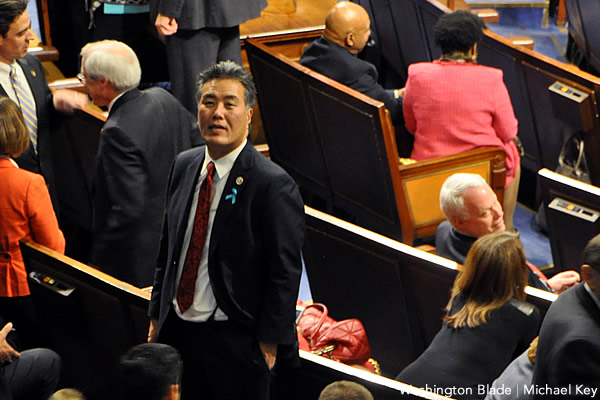
Rep. Mark Takano (D-Calif.) at the 2014 State of the Union Address. (Washington Blade photo by Michael Key)
National
National resources for trans and gender diverse communities
Amid attacks, help is available from wide range of organizations

The Trump administration has launched a series of executive orders and other initiatives restricting the rights of the transgender community since taking power in January, targeting military service, affirming healthcare, and participation in sports.
Though many executive orders are being challenged in court, it’s an uncertain time for a community that feels threatened. Despite the uncertainty, there are resources out there to help.
From legal assistance to mental health support, here’s a list of nonprofits and organizations dedicated to improving the everyday livelihood of trans and gender diverse people. These are mostly national organizations; there are many additional groups that work in local communities across the country. Some of these national groups will connect those in need of help to a local organization.
LEGAL HELP
President Trump issued an executive order declaring there are only two genders –– male and female –– which applies to legal documents and passports. The order doesn’t recognize the idea that one can transition their gender at birth to another gender.
Ash Lazarus Orr filed to renew his passport with a gender marker reflecting his identity. That was in January, and he still hasn’t received it. He refused to accept a passport without an accurate identification of who he is, so he filed a lawsuit with the ACLU in what is now known as Orr v. Trump.
Orr told the Washington Blade that not receiving his passport back has taken away his freedom of visiting family in Canada and receiving gender-affirming care from a trusted provider in Ireland.
The one thing getting him through this uncertain time is knowing who he’s fighting for –– the trans community, his loved ones, and himself.
“I’m trying to be that person that those younger parts of me needed growing up,” Orr said. Check out a couple of legal support organizations below:
Transgender Law Center
The Transgender Law Center (TLC) provides legal resources and assistance. TLC has a list –– called the Attorney Solidarity Network –– of attorneys that can provide advice or representation for trans people.
The organization also has a legal information help desk that answers questions regarding laws or policies impacting trans people.
Website: transgenderlawcenter.org
Phone: 510-587-9696
Email: [email protected]
Advocates For Trans Equality
With a variety of different programs tailored toward legal assistance and advocacy work, Advocates For Trans Equality’s reach is wide.
The non-profit offers the Name Change Project, which provides pro bono legal name change services to low-income trans, gender-non-conforming and nonbinary people by utilizing its partnerships with law firms and corporate law departments.
Advocates For Trans Equality also has departments and programs dedicated to increasing voter engagement, educating lawmakers on trans issues and offering litigation assistance to a small number of cases.
Website: transequality.org
Phone: 202-642-4542
General email: [email protected]
To contact a specific department or program, visit its website above.
ADVOCACY
Looking to take action and get involved? Act now.
American Civil Liberties Union
The ACLU is a national nonprofit organization that mobilizes local communities and advocates for national causes.
Getting involved is as easy as filling out letters to representatives or signing petitions. One live petition is to “defend trans freedom.”
You can also join its People Power platform, where you serve as a volunteer in your community to “advance civil liberties and civil rights for all.” ACLU has different chapters across the country, so visit its website for more information.
Website: aclu.org
Phone: 212-549-2500
MILITARY AND VETERANS
Trump signed an executive order in January banning transgender service members from serving, stating their identity “conflicts with a soldier’s commitment to an honorable, truthful and disciplined lifestyle, even in one’s personal life.”
Though the order has been legally challenged and struck down by a judge, U.S. Navy Lieutenant Rae Timberlake said it’s created an uncertain atmosphere for themself and other troops.
“All of the transgender service members I know have served with honor and integrity for many years…[and we’re] targeted for removal and not subject to any kind of review based on merit,” Timberlake, who joined the Navy at age 17, said. “There’s kind of just this cloud looming over our organizations and our units, because we know any day our transgender shipmates could no longer be on the team.”
But Timberlake’s message to any service member struggling because of the executive order was one of compassion and truth: “There’s no policy that can take away what you’ve accomplished and what you’ve done.”
Here are some organizations that support service members and veterans:
SPARTA Pride
SPARTA is a peer-support group composed of active duty, veteran and “future warrior” service members.
The group also engages in advocacy work and has helped change policies on gender neutral uniforms and reducing the time a trans service member would have to wait to return to their duties during their transition.
Contact SPARTA to learn more about joining its support network.
Website: spartapride.org
Email: [email protected]
Modern Military Association
Modern Military supports service members and veterans through advocacy, legal assistance and mental health support.
It tracks LGBTQ+ and HIV discrimination through reports made on its website, and offers guidance and advice to whoever submitted the report.
It also supports the mental health of LGBTQ+ veterans and their families through its Resilient Heroes Program. By signing up, you’ll receive virtual peer support and case management services with a mental health coordinator.
Website: modernmilitary.org
Phone: 202-328-3244
Email: [email protected]
CRISIS & MENTAL HEALTH SUPPORT
If you have a more urgent matter, or just need someone to listen, here are some organizations you can reach out to:
The Trevor Project
The Trevor Project offers 24/7 counseling services. Calling, texting or chatting is free and confidential, and you’ll get to speak with someone specialized in supporting LGBTQ youth.
The organization also focuses on public education by hosting online LGBTQ suicide prevention trainings. It advocates for policies and laws that contribute to supporting queer youth.
Website: thetrevorproject.org
Crisis hotline: 1-866-488-7386
General inquiry phone number: 212-695-8650
Trans Lifeline
Trans Lifeline is a hotline run and operated by trans people. Whether you’re questioning if you’re trans or are a trans person just wanting to talk, someone will be there to help. It’s free and confidential, and there won’t be any non-consensual active rescue, such as calling the emergency services.
The line is not 24/7, however. Check out its website for hours within your time zone.
Website: translifeline.org
Phone: 877-565-8860
Here are other organizations that offer support to the trans community:
TransFamilies (support): Support for families with a gender diverse child.
TransLatina Coalition (advocacy): Advocates for the specific needs of the transgender, gender expansive and intersex communities in the U.S.
TransAthlete (information): Provides informative resources about trans athletes.
Campaign for Southern Equality’s Trans Youth Emergency Project (healthcare support): A fund to help trans youth access lifesaving healthcare.
TransTech Social (economic empowerment): Dedicated to discovering and empowering the career-ready skills of LGBTQ+ people.
World Professional Association For Transgender Health (health): Resources, symposiums and research dedicated to improving transgender health.
Sylvia Rivera Law Project (legal): Legal programs and services for marginalized communities.
Gender Spectrum (support): Resources and support groups for trans youth and families.
The Okra Project (support): Creates and supports initiatives that provide resources for the Black Trans community.
The White House
White House does not ‘respond’ to reporters’ requests with pronouns included
Government workers were ordered not to self-identify their gender in emails

White House Press Secretary Karoline Leavitt and a senior advisor in the Department of Government Efficiency rejected requests from reporters who included their pronouns in the signature box of their emails, each telling different reporters at the New York Times that “as a matter of policy,” the Trump-Vance administration will decline to engage with members of the press on these grounds.
News of the correspondence between the journalists and the two senior officials was reported Tuesday by the Times, which also specified that when reached for comment, the White House declined to “directly say if their responses to the journalists represented a new formal policy of the White House press office, or when the practice had started.”
“Any reporter who chooses to put their preferred pronouns in their bio clearly does not care about biological reality or truth and therefore cannot be trusted to write an honest story,” Leavitt told the Times.
Department of Government Efficiency Senior Advisor Katie Miller responded, “I don’t respond to people who use pronouns in their signatures as it shows they ignore scientific realities and therefore ignore facts.”
Steven Cheung, the White House communications director, wrote in an email to the paper: “If The New York Times spent the same amount of time actually reporting the truth as they do being obsessed with pronouns, maybe they would be a half-decent publication.”
A reporter from Crooked media who got an email similar to those received by the Times reporters said, “I find it baffling that they care more about pronouns than giving journalists accurate information, but here we are.”
The practice of adding pronouns to asocial media bios or the signature box of outgoing emails has been a major sticking point for President Donald Trump’s second administration since Inauguration Day.
On day one, the White House issued an executive order stipulating that the federal government recognizes gender as a binary that is immutably linked to one’s birth sex, a definition excludes the existence of intersex and transgender individuals, notwithstanding the biological realities that natal sex characteristics do not always cleave neatly into male or female, nor do they always align with one’s gender identity .
On these grounds, the president issued another order that included a directive to the entire federal government workforce through the Office of Personnel Management: No pronouns in their emails.
As it became more commonplace in recent years to see emails with “she/her” or “he/him” next to the sender’s name, title, and organization, conservatives politicians and media figures often decried the trend as an effort to shoehorn woke ideas about gender (ideas they believe to be unscientific), or a workplace accommodation made only for the benefit of transgender people, or virtue-signaling on behalf of the LGBTQ left.
There are, however, any number of alternative explanations for why the practice caught on. For example, a cisgender woman may have a gender neutral name like Jordan and want to include “she/her” to avoid confusion.
A spokesman for the Times said: “Evading tough questions certainly runs counter to transparent engagement with free and independent press reporting. But refusing to answer a straightforward request to explain the administration’s policies because of the formatting of an email signature is both a concerning and baffling choice, especially from the highest press office in the U.S. government.”
U.S. Military/Pentagon
Air Force rescinds rule barring inclusion of preferred pronouns in email signatures
Conflict with language in military funding package may explain reversal

The U.S. Air Force has issued a “directive to cease the use of ‘preferred pronouns’ (he/him, she/her, or they/them) to identify one’s gender identity in professional communications,” according to a report published in the Hill on Wednesday.
The rule, which applies to both airmen and civilian employees, was first adopted on Feb. 4 pursuant to President Donald Trump’s anti-transgender executive order called, “Defending Women from Gender Ideology Extremism and Restoring Biological Truth to the Federal Government.”
Days after the administration’s issuance of that order on the first day of the president’s second term, the Office of Personnel Management instructed agencies across the whole of the federal government to remove pronouns from email signatures and enforce the policy barring employees from using them.
Additionally, on Jan. 27 Trump published an order barring trans people from joining the U.S. Armed Forces, indicating that those who are currently in serving would be separated from the military. The Pentagon is fending off legal challenges to the ban in federal courts.
Particularly given the extent of the new administration’s efforts to restrict the rights of trans Americans and push them out of public life, the Air Force’s reversal of the pronoun guidance was surprising.
According to reporting in Military.com, the move might have come because officials concluded the rule was in conflict with language in the military appropriations funding legislation passed by Congress in 2023.
The NDAA established that the defense secretary “may not require or prohibit a member of the armed forces or a civilian employee of the Department of Defense to identify the gender or personal pronouns of such member or employee in any official correspondence of the Department.”
-

 Opinions5 days ago
Opinions5 days agoIt’s time for new leadership on the Maryland LGBTQIA+ Commission
-

 The White House5 days ago
The White House5 days agoWhite House does not ‘respond’ to reporters’ requests with pronouns included
-

 Arts & Entertainment5 days ago
Arts & Entertainment5 days ago‘Gay is Good’ Pride Pils Can Celebrates Frank Kameny’s 100th Birthday for WorldPride in D.C.
-

 Sponsored5 days ago
Sponsored5 days agoTHC Drinks: What You Should Know About Cannabis Beverages



